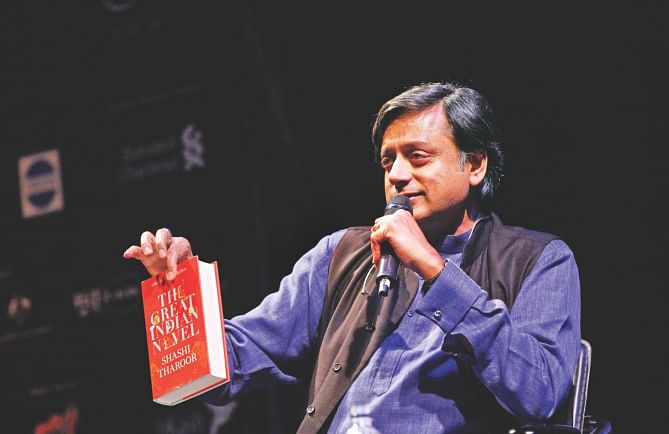Carnival of souls comes to an end
Carnival of souls comes to an end

Experimentation with new forms and subjects in the arts, and promotion of freedom of choice and expression were summarised through the presentation of a Bangla poetry rap in the closing event of the three-day long Hay Festival Dhaka 2014 yesterday.
The highlight of the day was the session on the silver jubilee edition of the Indian politician and writer Shashi Tharoor's novel The Great Indian Novel at the main stage in the afternoon.
The celebrated Indian writer discussed his perspectives on politics, economics, history and literature with Bangladeshi writer Kazi Anis Ahmed before a jam-packed audience.
Reflecting on his satirical work which employs characters having resemblance to those of the Indian epic Mahabharata and politicians of the Indian liberation movement, Tharoor, in reply to one of Ahmed's queries, said if he were to write the novel now he would have waited for a more tolerable time.
The vision of Hay was aptly captured by Pen International president John Ralston Saul in a session called Champion of the World.
Saul, the Canadian writer and activist, pointed out why words threaten those in power and suggested that conversation through festivals such as the Hay should be held between highly fractured groups of the society to ensure and promote freedom of speech.
In the morning Zia Haider Rahman read out excerpts from his debut novel 'In the Light of What We Know' which has received rave reviews in acclaimed international literary journals. He also answered questions from readers at a session chaired by Prof Ferdous Azim.
While adults flocked to the main stage to hear Zia speak, children played number and word games, and watched Bangla Sesame Street characters Tuktuki, Haloom and Ikra at Bottola.
Chinese author Jung Chang spoke about China's development and its reality. She also discussed her book Empress Dowager Cixi and shared her contribution to the Chinese women's movement in two separate sessions.
While Bengali and English poetry recitation kept the lawn occupied throughout the day, discussion on lyrics and poems took place at the main stage and Cosmic Tents.
Hay Festival Dhaka this year paid tribute to Shakespeare on his 450th birth anniversary with excerpts from three famous Shakespearean plays --- The Tempest, Hamlet and Macbeth performed by Dhaka Theatre, Dhaka University theatre department and Podatik TSC, followed by a discussion on the Bangla adaptation of Shakespeare by Aly Zaker and Sara Zaker.
BOOK, JOURNAL LAUNCHES
Daily Star Books launched Guerilla, a war-time memoir written by Shahzaman Mazumdar Bir Protik, at the Cosmic Tents in the afternoon.
Discussing the book, panelists Prof Syed Manzoorul Islam, Prof Kaiser Haq and freedom fighter A Qayyum Khan praised it.
Calling Mazumdar's narrative very reticent, Prof Islam said: “He does not talk much about himself although it is his story.”
Khan noted how Mazumdar kept his accounts limited only to the battle he fought on the ground.
“He does not deal with the politicians or the refugees,” he said.
The latest edition of Six Seasons Review and Jamini, two journals of Bengal Publication, and This Old World, a photo essay by Zeeshan Khan, were also launched yesterday.
Six Seasons Review is edited by Prof Fakrul Alam and Jamini by Luva Nahid Choudhury.